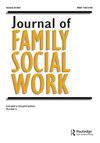Families transition, too! Military families transition out of service: a scoping review of research from the Five Eyes nations
IF 0.7
Q3 SOCIAL WORK
引用次数: 1
Abstract
ABSTRACT There is minimal research about the military-to-civilian transition (MCT) from the perspective of the family. The goal of this scoping review was to identify what is known about military families across the Five Eyes Nations (FVEY) (Australia, Canada, New Zealand, the United Kingdom, and the United States) during this phase as well as identify gaps in the evidence base. Scoping review methods were employed with a narrative review process to conceptualize and organize results. The initial search returned 2,219 sources. From these, 27 sources about military family experiences during MCT were identified. Overall, there was limited research on this topic with the majority of sources being from gray literature. A contributing factor to this lack of literature could be the conflation of the MCT with other military transitions (i.e. deployments). Sources highlighted four major themes that influenced identified needs and current services for military families during MCT: (1) mental health; (2) barriers to care; (3) financial needs; and (4) targeted transition support. The limited literature documents promising family skills-based interventions during MCT. However, there is a need for more empirical research on existing family-based interventions and experiences and needs of the family as a unit during MCT.家庭也在转型!军人家庭退役:“五眼”国家研究综述
摘要从家庭的角度对军队向平民过渡的研究很少。这项范围界定审查的目标是确定在这一阶段对五眼国家(澳大利亚、加拿大、新西兰、英国和美国)军人家庭的了解,并确定证据库中的差距。将范围界定审查方法与叙述性审查过程结合起来,对结果进行概念化和组织。最初的搜索返回了2219个来源。从中,确定了27个关于MCT期间军人家庭经历的来源。总体而言,对这一主题的研究有限,大多数来源于灰色文献。造成文献缺乏的一个因素可能是将MCT与其他军事过渡(即部署)混为一谈。消息来源强调了影响MCT期间确定的军人家庭需求和当前服务的四个主要主题:(1)心理健康;(2) 护理障碍;(3) 财政需求;以及(4)有针对性的过渡支助。有限的文献记录了MCT期间有希望的基于家庭技能的干预措施。然而,需要对现有的基于家庭的干预措施以及MCT期间家庭作为一个单元的经验和需求进行更多的实证研究。
本文章由计算机程序翻译,如有差异,请以英文原文为准。
求助全文
约1分钟内获得全文
求助全文
来源期刊

Journal of Family Social Work
SOCIAL WORK-
CiteScore
2.10
自引率
0.00%
发文量
4
期刊介绍:
Each issue of the Journal of Family Social Work contains peer reviewed research articles, conceptual and practice articles, creative works, letters to the editor, and book reviews devoted to innovative family theory and practice subjects. In celebrating social workers" tradition of working with couples and families in their life context, the Journal of Family Social Work features articles which advance the capacity of practitioners to integrate research, theory building, and practice wisdom into their services to families. It is a journal of policy, clinical practice, and research directed to the needs of social workers working with couples and families.
 求助内容:
求助内容: 应助结果提醒方式:
应助结果提醒方式:


